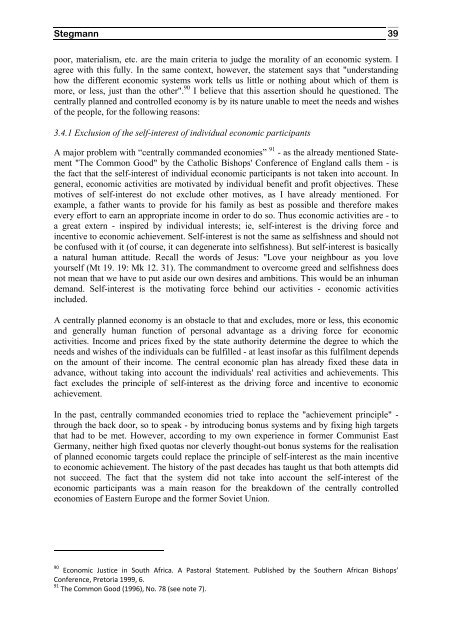Prof. Franz Josef Stegmann Bethlehem Social ... - Ordo Socialis
Prof. Franz Josef Stegmann Bethlehem Social ... - Ordo Socialis
Prof. Franz Josef Stegmann Bethlehem Social ... - Ordo Socialis
You also want an ePaper? Increase the reach of your titles
YUMPU automatically turns print PDFs into web optimized ePapers that Google loves.
<strong>Stegmann</strong><br />
poor, materialism, etc. are the main criteria to judge the morality of an economic system. I<br />
agree with this fully. In the same context, however, the statement says that "understanding<br />
how the different economic systems work tells us little or nothing about which of them is<br />
more, or less, just than the other". 90 I believe that this assertion should he questioned. The<br />
centrally planned and controlled economy is by its nature unable to meet the needs and wishes<br />
of the people, for the following reasons:<br />
3.4.1 Exclusion of the self-interest of individual economic participants<br />
A major problem with “centrally commanded economies” 91 - as the already mentioned Statement<br />
"The Common Good" by the Catholic Bishops' Conference of England calls them - is<br />
the fact that the self-interest of individual economic participants is not taken into account. In<br />
general, economic activities are motivated by individual benefit and profit objectives. These<br />
motives of self-interest do not exclude other motives, as I have already mentioned. For<br />
example, a father wants to provide for his family as best as possible and therefore makes<br />
every effort to earn an appropriate income in order to do so. Thus economic activities are - to<br />
a great extern - inspired by individual interests; ie, self-interest is the driving force and<br />
incentive to economic achievement. Self-interest is not the same as selfishness and should not<br />
be confused with it (of course, it can degenerate into selfishness). But self-interest is basically<br />
a natural human attitude. Recall the words of Jesus: "Love your neighbour as you love<br />
yourself (Mt 19. 19: Mk 12. 31). The commandment to overcome greed and selfishness does<br />
not mean that we have to put aside our own desires and ambitions. This would be an inhuman<br />
demand. Self-interest is the motivating force behind our activities - economic activities<br />
included.<br />
A centrally planned economy is an obstacle to that and excludes, more or less, this economic<br />
and generally human function of personal advantage as a driving force for economic<br />
activities. Income and prices fixed by the state authority determine the degree to which the<br />
needs and wishes of the individuals can be fulfilled - at least insofar as this fulfilment depends<br />
on the amount of their income. The central economic plan has already fixed these data in<br />
advance, without taking into account the individuals' real activities and achievements. This<br />
fact excludes the principle of self-interest as the driving force and incentive to economic<br />
achievement.<br />
In the past, centrally commanded economies tried to replace the "achievement principle" -<br />
through the back door, so to speak - by introducing bonus systems and by fixing high targets<br />
that had to be met. However, according to my own experience in former Communist East<br />
Germany, neither high fixed quotas nor cleverly thought-out bonus systems for the realisation<br />
of planned economic targets could replace the principle of self-interest as the main incentive<br />
to economic achievement. The history of the past decades has taught us that both attempts did<br />
not succeed. The fact that the system did not take into account the self-interest of the<br />
economic participants was a main reason for the breakdown of the centrally controlled<br />
economies of Eastern Europe and the former Soviet Union.<br />
90 Economic Justice in South Africa. A Pastoral Statement. Published by the Southern African Bishops’<br />
Conference, Pretoria 1999, 6.<br />
91 The Common Good (1996), No. 78 (see note 7).<br />
39















